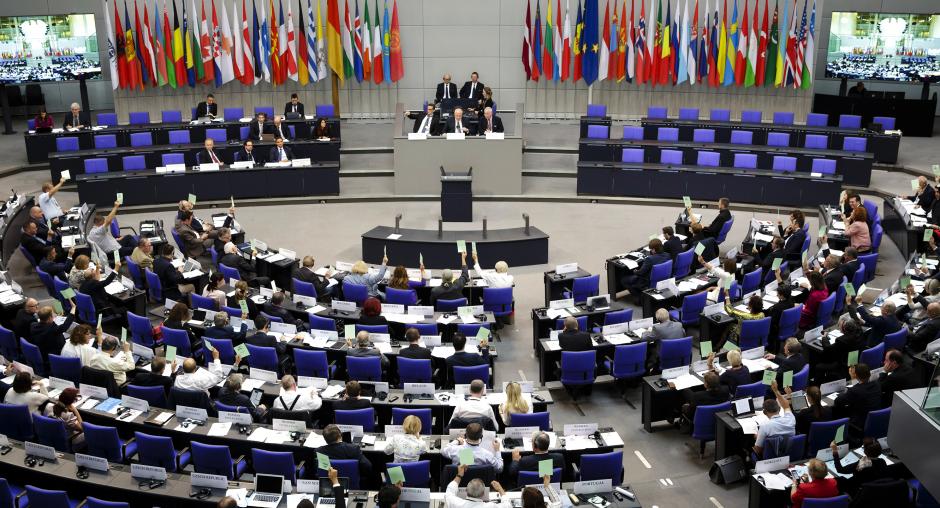Berlin Declaration calls for parliaments to strengthen oversight of OSCE commitments, governments to renew commitment to dialogue and détente

BERLIN, 11 July 2018 – OSCE parliamentarians should spare no effort in conveying OSCE values to parliamentary colleagues and to enact legislation that promotes full implementation of international commitments, the Parliamentary Assembly stated in the Berlin Declaration adopted at the German Bundestag today. (Download the Declaration in English, French or Russian.)
The current global geopolitical landscape, characterized by tensions, a deterioration of respect for human rights and ongoing economic and environmental challenges, underlines the urgency of fully implementing these commitments, OSCE parliamentarians said. Parliaments across the 57-nation OSCE area must strengthen the oversight of commitments and enhance co-operation, the Declaration says.
Nearly 300 parliamentarians from 53 OSCE participating States and four Partners for Co-operation participated in the 27th Annual Session, which took place 7-11 July at the Reichstag building in Berlin under the theme “Implementing OSCE Commitments: The Role of Parliaments.”
The Declaration, adopted following an amendment process carried out over several days of committee meetings, calls essential the “commitment to the fundamental principles of international law, human rights and the rule of law enshrined in the UN Charter and the Helsinki Final Act.” It urges renewed efforts to resolve conflicts, with a particular focus on Ukraine, Georgia, Moldova, and the Nagorno-Karabakh conflict.
"We have just adopted a very strong Berlin Declaration that we hope will serve to guide our work in the weeks, months and years ahead,” OSCE PA President George Tsereteli (Georgia) said in a speech after the adoption of the Declaration. “We should all work to strengthen the OSCE, including by implementing its principles and communicating its messages to our governments and the people of our home countries. We must let people know the value of this organization and why it matters.”
In a speech to the plenary session today, OSCE Secretary General Thomas Greminger said: “In today’s world, multilateralism and multilateral institutions are targets of acute criticism. Many of our citizens share this view. To ensure that the OSCE is sensitive to the aspirations and needs of our citizens, we need you, the Parliamentary Assembly, to represent their voices. The OSCE PA is by definition the most diverse and pluralistic of our structures. You represent a great variety of perspectives and interests.”
Roberto Montella, the Secretary General of the OSCE PA, commended the commitment of OSCE parliamentarians and assured them that they would have the full support of the International Secretariat in turning their recommendations into concrete actions.
In the Declaration, OSCE parliamentarians called for greater commitment from governments to the OSCE’s principles of dialogue and détente, including through the strengthening of arms control regimes, security sector reform, the development of confidence- and security-building measures, and the good-faith implementation of agreements.
The Declaration further calls on governments to ensure that human rights are respected by all security and intelligence services, both public and private, and urges parliaments to establish bodies for scrutinizing these services’ activities. Parliaments should also support the OSCE’s “structured dialogue” process, the Declaration says.
In the economic and environmental dimension, the Declaration stresses the unique role of parliaments in promoting reforms to implement OSCE commitments, in particular by fighting corruption, increasing transparency and cracking down on organized crime, money laundering and the financing of terrorism.
Recalling the nexus between the environment and security, the Declaration calls on parliaments “to promote universal ratification of the Paris Agreement on climate change and to boost the implementation of the Intended Nationally Determined Contributions to strengthen the global response to climate change.” It also urges parliaments to implement policies that promote environmental good governance.
International humanitarian and human rights law must be upheld during armed conflicts and the right of safe return of refugees and internally displaced persons must be respected, the Declaration says. It further calls for investigations into the serious human rights violations of people in conflict zones and occupied territories, including in the South Caucasus, Ukraine, and Cyprus.
All OSCE countries should “protect the rights of migrants and refugees, especially their freedom from arbitrary detention, and to actively work on the integration of refugees and protect their right to family reunification, with particular consideration for unaccompanied minors.” The Declaration also recalls the commitment of non-refoulement as a principle of customary international law, emphasizing that refugees and asylum seekers must not be forcibly returned to countries where the could face torture or inhumane treatment.
In addition to the three main resolutions, 16 supplementary items were adopted by the Assembly dealing with topics including counter-terrorism, human rights in Crimea (Ukraine), building communities free of human trafficking, building an effective protection framework for migrant children, security sector governance and reform, and combating gender-based violence.
OSCE PA Special Representative on Gender Issues Hedy Fry (Canada) spoke at the plenary session on Tuesday, focusing on violence against women as well as the need to include men in discussions about gender equality. The Special Representative noted that women contribute to economic productivity and competitiveness, so everyone benefits from their full participation in society.
In today’s plenary session, election results were also announced for the 2018-2019 term.
OSCE PA President George Tsereteli was re-elected. Peter Bowness (United Kingdom), Kari Henriksen (Norway), Kristian Vigenin (Bulgaria), and Pascal Allizard (France) were elected Vice-Presidents.
Elections to the OSCE PA’s general committees were held on Tuesday.
In the political and security committee, Filippo Lombardi (Switzerland) was elected Chair, Sofio Katsarava (Georgia) Vice-Chair, and Alan Farrell (Ireland) Rapporteur. In the economic and environmental committee, Nilza de Sena (Portugal) was elected Chair, Artur Gerasymov (Ukraine) Vice-Chair, and Elona Hoxha Gjebrea (Albania) Rapporteur. In the human rights committee, Margareta Kiener Nellen (Switzerland) was elected Chair, Michael Georg Link (Germany) Vice-Chair, and Kyriakos Kyriakou-Hadjiyianni (Cyprus) Rapporteur.
Download the Declaration in English, French or Russian. For more information, please visit http://www.oscepa.org/meetings/annual-sessions/2018-berlin-annual-session. Photos can be found on the OSCE PA's Flickr page: https://www.flickr.com/oscepa Videos from the past several days of meetings are on YouTube: https://www.youtube.com/oscepa/
